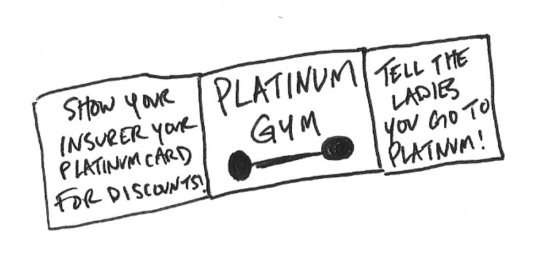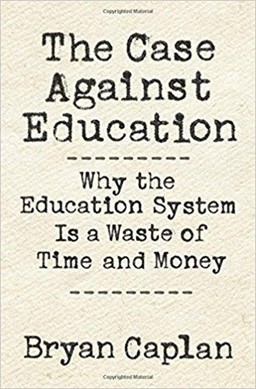The Gist: Conventional school teaches disturbingly little worthwhile.
A review of Bryan Caplan’s the Case Against Education.
When was the last time you used geometry?
Was it important for you to have spent a year studying the subject? Was it vital that the rest of us were forced to study it for a year?
Most likely the first time people use geometry after leaving school is incompetently helping with their kids’ homework, perpetuating the cycle of uselessness.

Figure 1. Solve for x. Was that worth a year of your life?
Economist Bryan Caplan makes the Case Against Education in a provocative book that takes on the question of the class clown: What does any of this have to do with life? And why are we making everyone spend 12+ years studying it?
I hope my obituary includes the following sentence: “He helped end the teaching of French in Tennessee public schools.” French is a language spoken by less than 2% of Earth’s population, a large portion of whom also speak English, and practically none of whom the average American student is likely to encounter. If he does, his high school education is unlikely to be as useful as Google Translate. It’s not difficult to guess that just about the only job in America that requires learning French is teaching French, again perpetuating the cycle of uselessness.

Figure 2. While the class did turn him onto berets, Claude was shocked that learning French did not help him in his career as a mime artist.
People are welcome to spend their own time and resources learning whatever they desire — but why do we spend a single tax dollar teaching French? More importantly, why do we waste an average of two years of classroom time teaching French when our kids can barely write in English, much less master math?
But hey, French is easy to denigrate. What about Spanish? Set aside for a moment whether the usefulness of Spanish represents American failure to integrate immigrants. If we assume its utility, we still have to reckon with the statistics of success: less than 3% of students report learning a foreign language “well.” You might as well go to the Five Minute University: “in five minutes you learn what the average college graduate remembers five years after he or she is out of school.”

Figure 3. Frequent customers of Taco Bell know as much Spanish as the average person taught for years.
Disturbingly, even the “useful” subjects are often useless. All those mandatory hours on science? Less than 5% of Americans will use them in their career. There are certainly advantages to math, but we toil through calculus without learning to balance a checkbook. We study great works of literature (when they’re not eliminated by the PC police) without learning how to write a business report.

Figure 4. Dr. Frankenstein credited his success to misunderstanding high school biology.
But isn’t education about the soul? About becoming a good citizen? If true, no one cares: two thirds of high school students report being bored in class EVERY DAY. There is scant evidence that Shakespeare systematically makes better humans – but even if he did, he’s bound to soon be excluded from the curriculum as representing the cisheteropatriarchy. Whatever your values, can you trust the state to teach them?
Yet it does not stop in high school. College is a vacation from responsibility. No parents, no boss. Caplan reports: “Fifty years ago, college was a full-time job. The typical student spent 40 hours a week in class or studying. Since the early 1960s, effort collapsed across the board. ‘Full-time’ college students average 27 hours of academic work per week.” College is a product that people pay a huge amount only to consume as little as possible. Instead of the quality of education, the biggest draw for a particular college is the quality of its amenities: how nice are the dorms?

Figure 5. College is like a really expensive gym where you still don’t actually work out but you get all the benefits because you can brag about your membership.
Even the classes that kids do attend are often in useless subjects — and not just absurdities like puppetry. Psychology is the most popular major in Tennessee colleges. Across the country, 94,000 students graduate with that major – but there are only 174,000 psychologists in the entire United States. History has 34,000 graduates a year – but there are only 3,500 historians. STEM majors are hard and can involve a practical education yet three quarters of STEM majors wind up in jobs that don’t use their specialized training.

Figure 6. “Tell us first about your childhood” “No, no, tell us about your dreams” “Forget that bunk, tell us about your sexual inadequacies.”
College is a game where students ask “Who is the easiest teacher?” not “Who is the best teacher?”; “What do I need to graduate?” not “What can I learn?”; “Will this be on the test?” not “Will this help me on the job?” And they’ve been rewarded over time with grade inflation, where B is now average (A- at Harvard). Despite that, most fail to finish: “About 25% of high school students fail to finish in four years. About 60% of full-time college students fail to finish in four years.” Publicly available debt finances the whole questionable enterprise, all the more a burden for those who don’t finish.
And what do college graduates do? They’re more likely to be cashiers or waiters than mechanical engineers. More likely to work as security guards or janitors than computer systems administrators. More likely to be cooks or bartenders than librarians.

Figure 7. “Yes, madame, here at Pierre’s we pride ourselves on hiring only the college-educated. Where else would we learn to pronounce ‘quinoa’?”
So why do people go? Social expectation… that leads to individual payoff. Because going to college does pay off for lots of graduates. Interestingly, Caplan reveals that one of the biggest payoffs to going to college is finding a high-earning spouse. But even the college-educated waiter commands a bigger salary than the waiter without. This can be taken too far, of course: Bill Gates would not likely have earned 73% more if he had not dropped out of Harvard – and because the most ambitious do go to college, you don’t know if it’s the person or the college that is producing the result.
Caplan explains by compellingly arguing that our formal education system doesn’t actually teach all that much – but it signals to employers three key qualities: intelligence, conscientiousness (i.e. the ability to complete tasks), and conformity. Importantly, education does not TEACH those qualities, it reveals them. By completing college, you show an employer you can handle and complete tasks that society expects of you, even if they’re irrelevant to your specific job. Seems like the Army would be just as good a signal – and much cheaper – if society would get aboard. Strikingly Caplan asks: “Does education have any effect on genuine intelligence? Despite decades of research, we really don’t know.”
One of the most compelling statistics Caplan offers for signaling over actual teaching is the earning power of dropouts. If actual teaching was the key reason college graduates earned more, then we’d expect that someone who completed 99% of college but failed to earn a degree would earn practically the same. Instead, the differences are stark. Get a diploma and you will earn more than the expected bump in income from completing freshman, sophomore, and junior years combined. And, if you recall senioritis, that is not because senior year involves some massive education gain. If you had to choose between receiving a diploma without having attended a minute of class or attending four years of class while missing a diploma, the choice is obvious. And many of us came much closer to the first in real life.
So what’s the implication? Caplan suggests that “subsidizing everyone’s schooling to improve our jobs is like urging everyone to stand up at a concert to improve our views. Both are ‘smart for one, dumb for all.’” His controversial preference is for a separation of school and state – for markets to effectively decide the proper role for education. Though it takes some math you might have forgotten from school, Caplan argues that more and more people going to college actually impoverishes society at large (do we really need to subsidize college-educated waiters?).
More modestly, Caplan suggests that the curricula at state schools from kindergarten through graduate school needs to be reorganized to get an actual return and government loans should not be available for a host of majors. In high schools, Caplan says we need a lot more vocational training: “Most education experts remain leery of vocational ed. Chief objection: it’s shortsighted. The vocational track teaches students specific skills they need for their first job. The academic track teaches students general skills they need for every job. The wise approach is to set everyone on the academic track. Let kids max out their general skills before targeting any particular vocation. This objection is confused. While literacy and numeracy are genuinely general skills, most academic classes amount to vocational training for ultrarare vocations. Think about classic college prep in literature, history, social science, and foreign language.” The vast majority of students will not wind up authors, historians, academics, linguists — or even mathematicians or scientists.
But what about that which is actually within your control: the education of yourself or your kids? Caplan actually has an extensive section about what your expected payoff might be as an individual based on your early school performance – if you are a good student, college is going to be a very good financial bet, especially if you study STEM, even if you don’t use any of it. But if you are a struggling student, college is far more questionable.
Caplan himself went to Berkeley and got a PhD at Princeton. I took five years of Latin, studied history at Stanford, and went onto Vanderbilt law school — all to develop real estate and write book reviews. I think his self-label is correct: he reports as a whistleblower — someone who has thrived in the education system but is prepared to tell all its flaws. He does not succumb to the bias to just say nice things like “all education is good all the time.” But even if you do go through the faulty American way, don’t forget the immortal words of Mark Twain: never let schooling get in the way of your education.

Figure 8. Click here to buy the Case against Education. 8/10. Very provocative arguments but gets bogged down by math in the middle. Feel free to skip ahead.
Thanks for reading! If you enjoyed this review, please sign up for my email in the box below and forward it to a friend: Know anyone with kids in school? How about anyone who cares about education?
I read over 100 non-fiction books a year (history, business, self-management) and share a review (and terrible cartoons) every couple weeks with my friends. Really, it’s all about how to be a better American and how America can be better. Look forward to having you on board!

Hello very cool website!! Man .. Excellent ..
Superb .. I will bookmark your web site and take the
feeds additionally? I am satisfied to seek out a lot of
helpful info right here within the submit, we’d like develop extra strategies in this regard, thanks for sharing.
. . . . .
I’m very pleased to uncover this web site. I want to to thank you for your time just for this fantastic read!! I definitely appreciated every part of it and I have you book-marked to look at new stuff on your site.
It’s actually a cool and useful piece of info.
I’m glad that you shared this helpful info with us.
Please keep us informed like this. Thank you for sharing.
Do you mind if I quote a few of your articles as long as I provide credit
and sources back to your site? My website is in the very same niche as yours and my users would definitely benefit
from a lot of the information you present here. Please let me know if this okay with you.
Appreciate it!
A fascinating discussion is definitely worth comment. I do think that you need to publish more on this topic, it may not be a taboo subject but typically people don’t talk about such subjects. To the next! All the best!!
Wonderful beat ! I wish to apprentice while you amend your web
site, how could i subscribe for a blog site? The account helped me a appropriate deal.
I have been a little bit acquainted of this your
broadcast offered bright transparent idea
Very good write-up. I definitely appreciate this website. Keep writing!
Hey there! This is my first visit to your blog! We are a
team of volunteers and starting a new project in a community in the same niche.
Your blog provided us beneficial information to work
on. You have done a extraordinary job!
Useful info. Lucky me I found your site accidentally, and I
am surprised why this coincidence didn’t happened in advance!
I bookmarked it.
of course like your web-site but you need to take a look at the spelling on several
of your posts. A number of them are rife with spelling problems and I in finding it very troublesome to tell the truth however I
will definitely come back again.
This site really has all the info I needed concerning this subject and didn’t know who to ask.
I really like your blog.. very nice colors & theme. Did you design this website yourself or did you hire someone to do it for
you? Plz reply as I’m looking to design my own blog and would like to know where u got this from.
thanks
Hello! I’ve been following your website for a long time now
and finally got the bravery to go ahead and give you a
shout out from Atascocita Texas! Just wanted to say keep up the excellent job!
Wow! In the end I got a weblog from where I be capable
of genuinely get useful information regarding my study and knowledge.
Having read this I thought it was very enlightening. I appreciate you taking the time and effort to put this content together. I once again find myself personally spending way too much time both reading and commenting. But so what, it was still worth it!
I truly love your site.. Very nice colors & theme.
Did you build this site yourself? Please reply back as I’m attempting to create my own personal site and would like to learn where you got this from or exactly what the
theme is called. Many thanks!
I couldn’t resist commenting. Very well written!
I seriously love your website.. Excellent colors &
theme. Did you make this web site yourself? Please reply back as I’m looking
to create my own personal website and would love to learn where you got
this from or what the theme is named. Thank you!
I know this website presents quality based content and
other data, is there any other website which provides these kinds
of information in quality?
For you, this suggersts that you will have access to tons of slots with immersive
graphics, exciting bonus rounds, and high RTPs.
Visit my website – Online Casino
This paragraph provides clear idea designed for the new people of
blogging, that really how to do running a blog.
It’s the best time to make a few plans for the longer
term and it is time to be happy. I have learn this publish
and if I could I desire to recommend you few interesting issues or advice.
Maybe you can write subsequent articles relating to this article.
I desire to read even more things approximately
it!
Woah! I’m really digging the template/theme of this blog.
It’s simple, yet effective. A lot of times it’s very
hard to get that “perfect balance” between superb
usability and appearance. I must say you have done a fantastic job with this.
In addition, the blog loads very fast for me on Internet explorer.
Excellent Blog!
I’m gone to tell my little brother, that he should also pay a visit this weblog on regular basis to get updated from most recent news update.
Thanks , I’ve recently been looking for info approximately this subject for a long time and yours is the greatest I’ve found out till now.
But, what in regards to the conclusion? Are you certain in regards to the supply?
What’s Going down i am new to this, I stumbled upon this I have found It positively useful and it has aided
me out loads. I hope to give a contribution &
assist other customers like its helped me. Good job.
After looking into a number of the blog posts on your blog, I
truly appreciate your technique of blogging.
I book-marked it to my bookmark webpage list and will be checking back in the near future.
Please check out my web site as well and tell me what you
think.
The growth of social gamimg is due to the adoption of social media platfkrms inn the area, the
availability of social games on mobile devices and the rise of casual gaming.
Stop by my site … Casino Play Online
This is very interesting, You’re a very skilled blogger.
I’ve joined your rss feed and look forward to seeking more of your
magnificent post. Also, I’ve shared your site in my social networks!
Hi, i feel that i saw you visited my blog thus i got here to return the desire?.I am attempting to in finding issues
to enhance my website!I assume its adequate to make use of some of your ideas!!
All they have to do is sign up, and a properly-deserved noo
deposit bonus is addsd to their Best Online Casino account.
Nice post. I was checking constantly this weblog and I’m impressed!
Very helpful info specially the final phase
🙂 I deal with such info a lot. I used to be seeking this certain information for a long
time. Thank you and best of luck.
Yes, but issue in the commission of five% when the Banker hand wins.
Also visiut my site – onca.cc
BetUK also has downloadable mobile apps for smartphone users to make usse
of from aany location.
my homepage; Sports betting sites
The organization has receivesd funding from the Mayor’s Workplace of Immigrant Affairs, the Rockefeller
Foundation, NYU Neighborhood Fund, amongst other folks.
Alsso visit my page web page
As such, working in roles that prioritize other folks may possibly
be an empowering career move.
Stop by my blog … 쩜오알바
The 2020 HILDA Survey located minimal effects of
working from dwelling on jjob satisfaction.
Feel free to surf to my web-site … website
General, 23% of all jobs traditionally held bby guys were then held byy female workers.
My blog: 노래방알바